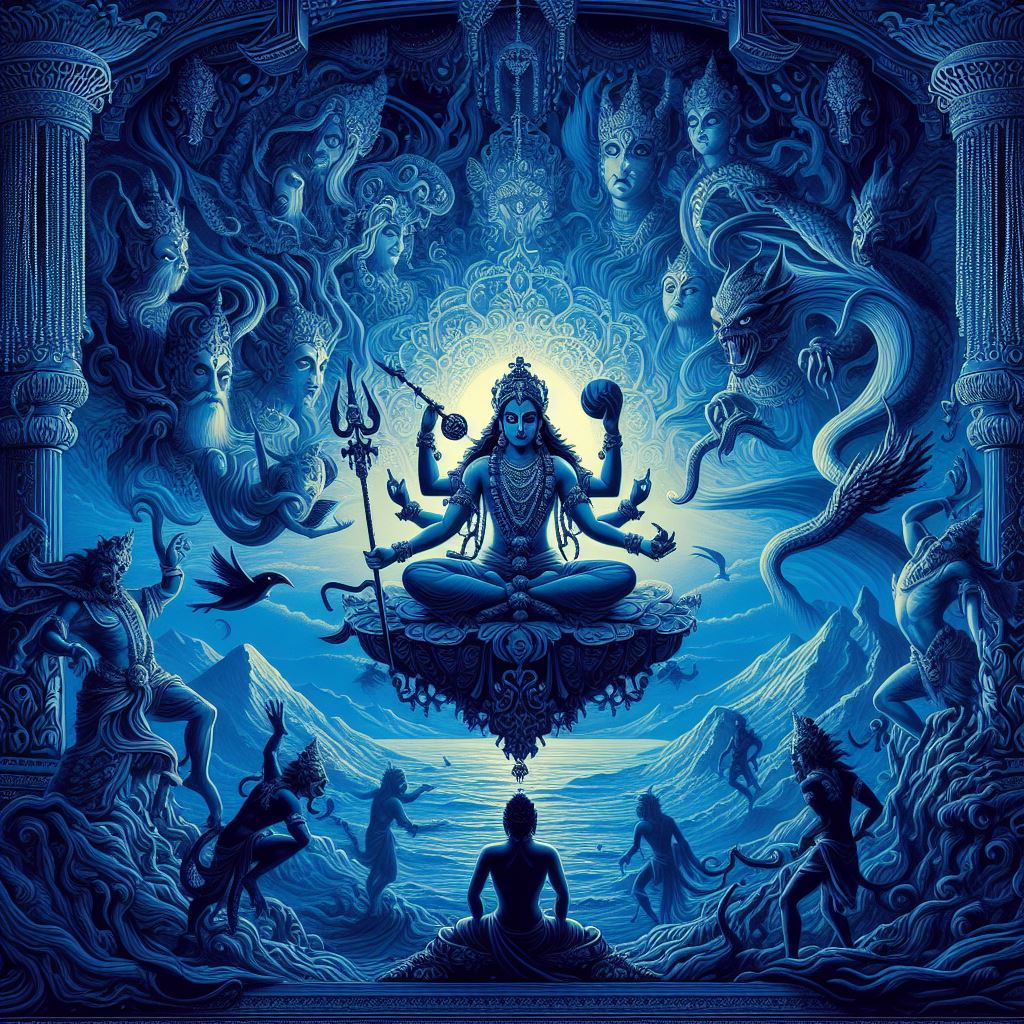The sixteenth chapter of the Bhagavad Gita is Daivasura Sampad Vibhaga Yoga. In this chapter, Krishna describes explicitly the two kinds of natures among human beings – divine and demoniac. Those who possess demonaic qualities associate themselves with the modes of passion and ignorance do not follow the regulations of the scriptures and embrace materialistic views. These people attain lower births and further material bondage. But people who possess divine qualities, follow the instructions of the scriptures, associate themselves with the mode of goodness and purify the mind through spiritual practices. This leads to the enhancement of divine qualities and they eventually attain spiritual realization.
slok:’16.1′,
‘śrībhagavānuvāca . abhayaṃ sattvasaṃśuddhirjñānayogavyavasthitiḥ . dānaṃ damaśca yajñaśca svādhyāyastapa ārjavam ||16-1||’,
‘16.1 The Blessed Lord said Fearlessness, purity of heart, steadfastness in knowledge and Yoga, almsgiving, control of the senses, sacrifice, study of scriptures, austerity and straightforwardness.’,
slok:’16.2′,
‘ahiṃsā satyamakrodhastyāgaḥ śāntirapaiśunam . dayā bhūteṣvaloluptvaṃ mārdavaṃ hrīracāpalam ||16-2||’,
‘16.2 Harmlessness, truth, absence of anger, renunciation, peacefulness, absence of crookedness, compassion towards beings, non-covetousness, gentleness, modesty, absence of fickleness.’,
slok:’16.3′,
‘tejaḥ kṣamā dhṛtiḥ śaucamadroho nātimānitā . bhavanti sampadaṃ daivīmabhijātasya bhārata ||16-3||’,
‘16.3 Vigour, forgiveness, fortitude, purity, absence of hatred, absence of pride these belong to the one born for a divine state, O Arjuna.’,
slok:’16.4′,
‘dambho darpo.abhimānaśca krodhaḥ pāruṣyameva ca . ajñānaṃ cābhijātasya pārtha sampadamāsurīm ||16-4||’,
‘16.4 Hypocrisy, arrogance and self-conceit, anger and also harshness and ignorance, belong to one who is born for a demoniacal state, O Partha (Arjuna).’,
slok:’16.5′,
‘daivī sampadvimokṣāya nibandhāyāsurī matā . mā śucaḥ sampadaṃ daivīmabhijāto.asi pāṇḍava ||16-5||’,
‘16.5 The divine nature is deemed conducive to liberation, and the demoniacal to bondage. Grieve not, O Arjuna, thou art born with divine endowments.’,
slok:’16.6′,
‘dvau bhūtasargau loke.asmindaiva āsura eva ca . daivo vistaraśaḥ prokta āsuraṃ pārtha me śṛṇu ||16-6||’,
‘16.6 There are two types of beings in this world, the divine and the demoniacal; the divine has been described at length; hear from Me, O Arjuna, of the demoniacal.’,
slok:’16.7′,
‘pravṛttiṃ ca nivṛttiṃ ca janā na vidurāsurāḥ . na śaucaṃ nāpi cācāro na satyaṃ teṣu vidyate ||16-7||’,
‘16.7 The demoniacal know not what to do and what to refrain from; neither purity, nor right conduct nor truth is found in them.’,
slok:’16.8′,
‘asatyamapratiṣṭhaṃ te jagadāhuranīśvaram . aparasparasambhūtaṃ kimanyatkāmahaitukam ||16-8||’,
‘16.8 They say, “This universe is without truth, without (moral) basis, without a God, brought about by mutual union, with lust for its cause; what else?”‘,
slok:’16.9′,
‘etāṃ dṛṣṭimavaṣṭabhya naṣṭātmāno.alpabuddhayaḥ . prabhavantyugrakarmāṇaḥ kṣayāya jagato.ahitāḥ ||16-9||’,
‘16.9 Holding this view, these ruined souls of small intellect and fierce deeds, come forth as the enemies of the world for its destruction.’,
slok:’16.10′,
‘kāmamāśritya duṣpūraṃ dambhamānamadānvitāḥ . mohādgṛhītvāsadgrāhānpravartante.aśucivratāḥ ||16-10||’,
‘16.10 Filled with insatiable desires, full of hypocrisy, pride and arrogance, holding evil ideas through delusion, they work with impure resolves.’,
slok:’16.11′,
‘cintāmaparimeyāṃ ca pralayāntāmupāśritāḥ . kāmopabhogaparamā etāvaditi niścitāḥ ||16-11||’,
‘16.11 Giving themselves over to immeasurable cares ending only with death, regarding gratification of lust as their highest aim, and feeling sure that that is all.’,
slok:’16.12′,
‘āśāpāśaśatairbaddhāḥ kāmakrodhaparāyaṇāḥ . īhante kāmabhogārthamanyāyenārthasañcayān ||16-12||’,
‘16.12 Bound by a hundred ties of hope, given over to lust and anger, they strive to obtain by unlawful means hoards to wealth for sensual enjoyments.’,
slok:’16.13′,
‘idamadya mayā labdhamimaṃ prāpsye manoratham . idamastīdamapi me bhaviṣyati punardhanam ||16-13||’,
‘16.13 “This has been gained by me today; this desire of mine I shall fuffil; this is mine and this wealth also shall be mine in future.”‘,
slok:’16.14′,
‘asau mayā hataḥ śatrurhaniṣye cāparānapi . īśvaro.ahamahaṃ bhogī siddho.ahaṃ balavānsukhī ||16-14||’,
‘16.14 “That enemy has been slain by me; and others also I shall slay. I am the lord. I enjoy. I am perfect, powerful and happy.”‘,
slok:’16.15′,
‘āḍhyo.abhijanavānasmi ko.anyo.asti sadṛśo mayā . yakṣye dāsyāmi modiṣya ityajñānavimohitāḥ ||16-15||’,
‘16.15 “I am rich and born in a noble family. Who else is equal to me? I shall perform sacrifices. I shall give (charity). I shall rejoice,” thus deluded by ignorance.’,
slok:’16.16′,
‘anekacittavibhrāntā mohajālasamāvṛtāḥ . prasaktāḥ kāmabhogeṣu patanti narake.aśucau ||16-16||’,
‘16.16 Bewildered by many a fancy, entangled in the snare of delusion, addicted to the gratification of lust, they fall into a foul hell.’,
slok:’16.17′,
‘ātmasambhāvitāḥ stabdhā dhanamānamadānvitāḥ . yajante nāmayajñaiste dambhenāvidhipūrvakam ||16-17||’,
‘16.17 Self-conceited, stubborn, filled with the pride and intoxication of wealth, they perform sacrifices in name out of ostentation, contrary to scriptural ordinances.’,
slok:’16.18′,
‘ahaṃkāraṃ balaṃ darpaṃ kāmaṃ krodhaṃ ca saṃśritāḥ . māmātmaparadeheṣu pradviṣanto.abhyasūyakāḥ ||16-18||’,
‘16.18 Given over to egoism, power, haughtiness, lust and anger, these malicious people hate Me in their own bodies and in those of others.’,
slok:’16.19′,
‘tānahaṃ dviṣataḥ krurānsaṃsāreṣu narādhamān . kṣipāmyajasramaśubhānāsurīṣveva yoniṣu ||16-19||’,
‘16.19 Those cruel haters, worst among men in the world, I hurl those evil-doers into the wombs of demons only.’,
slok:’16.20′,
‘āsurīṃ yonimāpannā mūḍhā janmani janmani . māmaprāpyaiva kaunteya tato yāntyadhamāṃ gatim ||16-20||’,
‘16.20 Entering into demoniacal wombs and deluded, birth after birth, not attaining Me, they thus fall, O Arjuna, into a condition still lower than that.’,
slok:’16.21′,
‘trividhaṃ narakasyedaṃ dvāraṃ nāśanamātmanaḥ . kāmaḥ krodhastathā lobhastasmādetattrayaṃ tyajet ||16-21||’,
‘16.21 Triple is the gate of this hell, destructive of the self lust, anger and greed; therefore one should abandon these three.’,
slok:’16.22′,
‘etairvimuktaḥ kaunteya tamodvāraistribhirnaraḥ . ācaratyātmanaḥ śreyastato yāti parāṃ gatim ||16-22||’,
‘16.22 A man who is liberated from these three gates to darkness, O Arjuna, practises what is good for him and thus goes to the Supreme Goal.’,
slok:’16.23′,
‘yaḥ śāstravidhimutsṛjya vartate kāmakārataḥ . na sa siddhimavāpnoti na sukhaṃ na parāṃ gatim ||16-23||’,
‘16.23 He who, having cast aside the ordinances of the scriptures, acts under the impulse of desire, attains not perfection, nor happiness nor the Supreme Goal.’,
slok:’16.24′,
‘tasmācchāstraṃ pramāṇaṃ te kāryākāryavyavasthitau . jñātvā śāstravidhānoktaṃ karma kartumihārhasi ||16-24||’,
‘16.24 Therefore, let the scripture be thy authority in determining what ought to be done and what ought not to be done. Having known what is said in the ordinance of the scriptures, thou shouldst act here in this world.’,
slok:’16.25′,
‘OM tatsaditi śrīmadbhagavadgītāsūpaniṣatsu brahmavidyāyāṃ yogaśāstre śrīkṛṣṇārjunasaṃvāde daivāsurasampadvibhāgayogo nāma ṣoḍaśo.adhyāyaḥ ||16-25||’,
‘Swami Sivananda did not comment on this sloka’,

